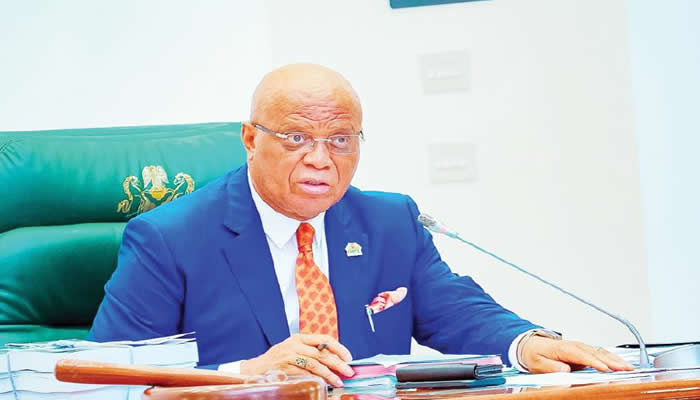The recent defection of Akwa Ibom State Governor, Umo Eno, from the Peoples Democratic Party (PDP) to the All Progressives Congress (APC) has ignited a firestorm of controversy within the state’s political landscape. Dr. Tom Fredfish, a prominent PDP chieftain and chairman of the PDP Advocate for Peace and Justice, has vehemently denounced the governor’s move, labeling it illegal and calling on the national secretariat of the PDP to challenge the defection in court. Fredfish argues that Eno’s stated reasons for defecting – a purported crisis within the PDP and his admiration for President Bola Tinubu – are insufficient and do not justify abandoning the party that sponsored his gubernatorial bid. He emphasizes that the people of Akwa Ibom voted for Eno based on the PDP’s platform and mandate, not for him to align with the president at the expense of the electorate’s wishes. Fredfish further contends that the defection contravenes Section 221 of the party’s constitution, which stipulates that a political party shall sponsor a candidate in an election. He draws an analogy to dining at one restaurant and paying at another, highlighting the inherent unfairness and breach of trust in Eno’s actions. He expresses disappointment in the silence of the state PDP leadership, suggesting that their inaction stems from a potential inclination to follow the governor’s lead.
Fredfish also dismisses Eno’s earlier claim that he defected due to concerns about securing a second term, questioning why the governor is the sole individual preoccupied with this ambition while other elected officials remain committed to the PDP. This raises concerns about the governor’s motivations and whether personal political calculations are driving his decisions rather than the best interests of the state. The comparison to using Ibom Air and paying Air Peace further underscores the perceived betrayal of the PDP and the electorate who entrusted him with leadership under the party’s banner. Fredfish’s strong condemnation reflects a deeper concern about the erosion of party loyalty and the potential for political opportunism to undermine the democratic process. His call for legal action underscores the seriousness of the situation and the need for the PDP to uphold its constitutional principles.
Adding fuel to the fire, another PDP stalwart, Prince Jeremiah Akpanudo, has echoed Fredfish’s outrage and demanded decisive action from the party’s national secretariat. Akpanudo urges the PDP to declare vacant the seats of all state House of Assembly and National Assembly members who followed Governor Eno to the APC, arguing that their defection constitutes a conspiracy to “sell out the party to strangers.” He further calls for the dissolution of the state executive council, accusing them of complicity in the governor’s actions. Akpanudo’s pronouncements reflect a growing sentiment within the PDP that the defection is not simply a political maneuver but a deliberate betrayal of the party and the people of Akwa Ibom. He emphasizes that the governor’s defection is an act of “insensitivity” and “double standard,” given Eno’s previous statements about retaining his PDP membership even if he aligned with the APC. This perceived duplicity further fuels the anger and distrust within the PDP ranks.
Akpanudo’s appeal to the Independent National Electoral Commission (INEC) and the Akwa Ibom State Independent Electoral Commission (AKISIEC) to conduct bye-elections for the vacated seats, including the governorship, underscores the belief that the mandate belongs to the PDP, not to individual politicians. He contends that the voters chose the party, not the names on the ballot, and therefore the defectors have no right to take the mandate to another party. This argument highlights the fundamental principle of representative democracy and the importance of party affiliation in ensuring accountability to the electorate. Akpanudo’s proactive stance, including consulting with lawyers to challenge the legality of the defection, signals a determination to fight for the PDP’s interests and uphold the integrity of the electoral process.
The governor’s defection has exposed deep fissures within the Akwa Ibom political landscape, raising critical questions about party loyalty, political ethics, and the sanctity of the electoral mandate. The strong reactions from prominent PDP figures like Fredfish and Akpanudo indicate a resolute opposition to Eno’s move and a commitment to holding him and other defectors accountable. The calls for legal action and bye-elections signal a protracted political battle that could reshape the state’s political dynamics in the lead-up to the 2027 elections. The situation also underscores the broader challenges facing Nigerian democracy, including the prevalence of party defections and the potential for political opportunism to undermine the will of the people.
The unfolding events in Akwa Ibom will be closely watched as they could set a precedent for how future defections are handled and whether political parties can effectively enforce their internal rules and protect their mandates. The outcome of the legal challenges and the potential bye-elections will significantly impact the balance of power in the state and influence the political landscape in the years to come. The controversy also highlights the importance of robust legal frameworks and institutional mechanisms to address party defections and ensure the integrity of the democratic process. The ongoing saga in Akwa Ibom serves as a stark reminder of the fragility of political alliances and the ongoing struggle to uphold democratic principles in a complex and evolving political environment.


